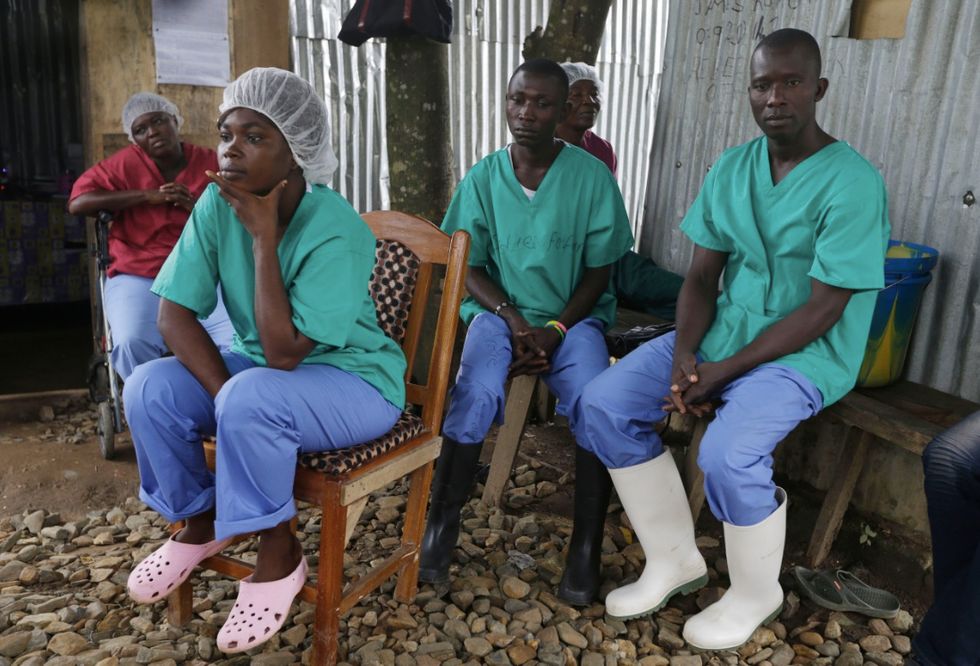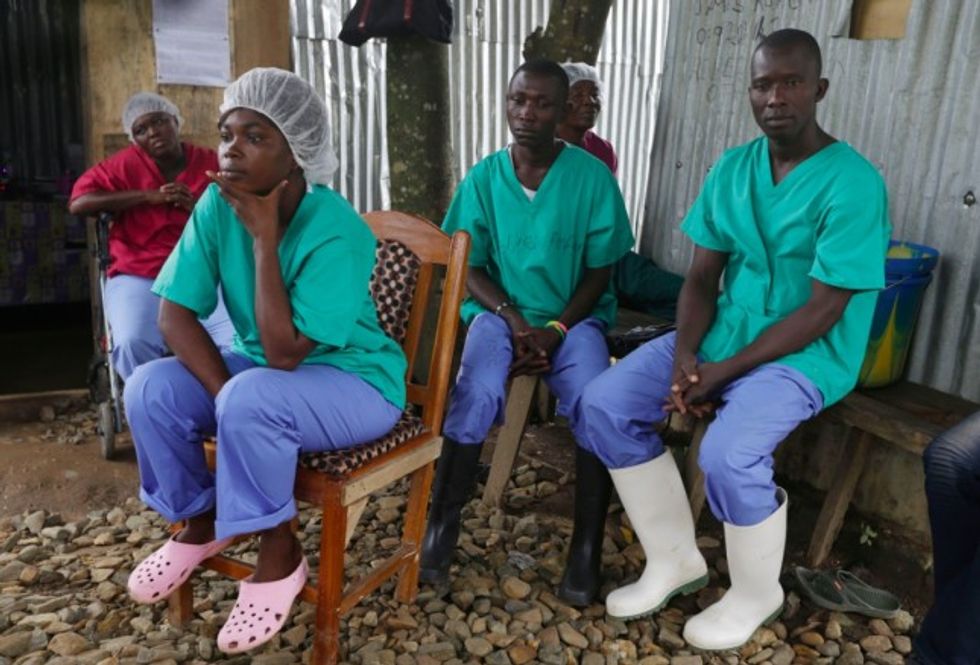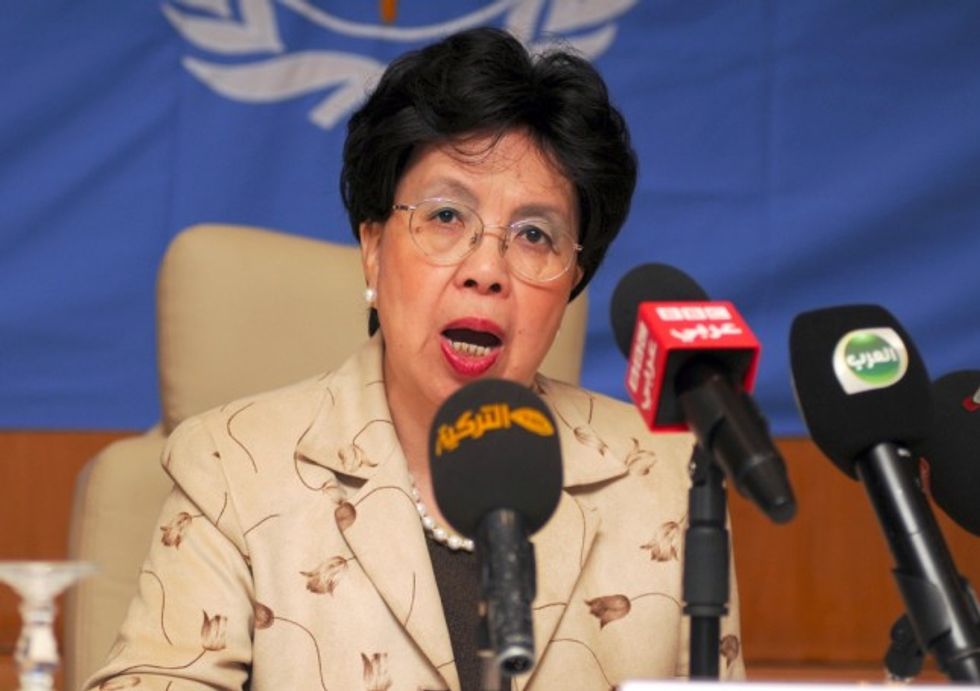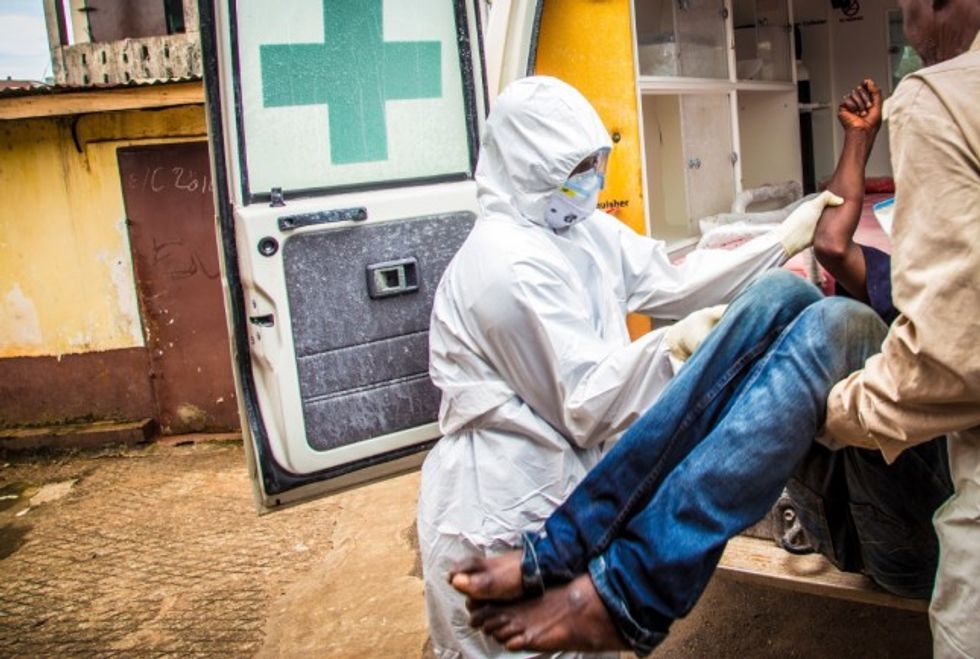
In this Monday, Aug. 10, 2015 photo, health workers take a break at the Kenema Government Hospital, where more than 40 health workers died of Ebola, in Kenema, eastern Sierra Leone. (AP Photo/Sunday Alamba)

KENEMA, Sierra Leone (AP) — Something didn't smell right.
As a worker at Kenema Government Hospital mixed a batch of chlorine on a broiling August day, he noticed it didn't have its typically strong, bleach-like odor. Concerned, he turned to a consultant with the World Health Organization, who tested the disinfectant and found barely any active ingredient.
"I was deeply shocked," the consultant, Jerome Souquet, wrote in an email to his boss in Freetown, Sierra Leone's capital. Souquet said the consequences of using the ineffective chlorine "could be catastrophic, and cause immediate infection of all the staff."
Questionable chlorine was just one of a toxic mix of avoidable problems faced by Ebola responders in Kenema last summer as the outbreak was spiking. Weak leadership, shoddy supplies and infighting exacerbated a chaotic situation at a critical front in the battle against the virus, an Associated Press investigation has found. More than 40 health workers died in Kenema — a devastating loss in the fight to control an epidemic that has claimed more than 11,000 lives.

In March, AP reported that senior officials at WHO's Geneva headquarters resisted calls to declare Ebola an international health emergency — the equivalent of an SOS signal — on political and economic grounds. But newly obtained documents, recordings of conference calls and interviews with key players on the ground show that even after the alarm was raised, WHO and others struggled to put together a decisive response.
The World Health Organization's Director-General Dr. Margaret Chan — whose U.N. agency is charged with leading the fight against global outbreaks — demanded the dispatch of vehicles and equipment, but penny-pinching meant only a trickle of cash made its way to frustrated responders. Supplies were so scarce that body bags — which protect aid workers from exposure to the highly contagious corpses — ran out. Confusion delayed the construction of a new treatment clinic.

Experts say the fumbling cost lives across West Africa.
"There's no question that a better and earlier response from WHO could have resulted in thousands and thousands of fewer deaths than we saw," said Dr. Irwin Redlener, director of the National Center for Disaster Preparedness at Columbia University in New York.
The situation at Kenema hospital last summer was horrific. Blood-drenched patients lay in agony in understaffed wards as the dead cluttered the hallways. Health workers sweltered through grueling shifts despite attacks from locals who threatened to burn the building down, convinced doctors and nurses were spreading the disease deliberately.
Meanwhile WHO was "paralyzed," according to Joseph Fair, an American disease expert who was in Freetown advising the Sierra Leone government. In interviews with AP, he described "death by conference call" as health officials argued about things like whether to order more ambulances and the proper color of body bags.
Two months ago, a WHO-commissioned panel criticized the organization's leadership but did not mention the logistical problems, infighting or other details uncovered by AP. The report called for accountability, but did not name a single person or department responsible for the failures. The evaluation concluded that "WHO was reported to be respected for its technical work in the three (Ebola-affected) countries."
"WE ARE AT RISK OF VERY POOR PERCEPTION"
Kenema, a diamond town whose potholed roads turn to red sludge in the rainy season, was a microcosm of the messy response across West Africa as Ebola raged out of control last year. Identified in the West African forest in early 2014, the virus appeared to abate in May before surging back, killing hundreds in Guinea, Sierra Leone and Liberia throughout June and July before belatedly triggering an international emergency in August. Officials estimate the outbreak won't be stopped before the end of 2015.
One of Sierra Leone's largest cities, Kenema's proximity to Guinea's forest region and its decent road link to Freetown made it a key seeding point as the virus spread across the region. It was identified as one of two priority areas in an urgent July 24 message sent by WHO's Chan to her senior staff.
"Transportation, PPE (personal protective equipment) and other equipment must (be) provided," she wrote in the email.
That did not quite happen.
Staffers were so strapped for safety gear that nurse Donnell Tholley said they sometimes resorted to ill-fitting gloves to protect their hands and stray plastic packaging instead of heavy-duty footwear.
And then there was the chlorine.
In Kenema, the disinfectant was made from powder kept in 10- or 25- kilogram (20- to 50-pound) drums in the hospital's storeroom. The powder was mixed with water in several stages to make chlorine solution for washing hands and sterilizing surfaces. Many aid organizations in West Africa — like Doctors Without Borders, which had a facility in nearby Kailahun — imported the powder. WHO decided to use chlorine from the government's own supplies in Freetown.
That proved to be a mistake.
By the time Souquet wrote his Aug. 20 email, it was the second time in several days the hospital had been left with defective chlorine.
Drums were repeatedly found with tags ripped off, expiration dates obscured or marked by evidence of tampering. Hospital porter Juma Musa described his horror at opening a batch of chlorine powder in July to find that it had expired more than a year earlier.
While in that case Musa said he stopped the spoiled chlorine from being used, other porters told AP they could not rule out that bad batches slipped through. The problem badly rattled staff at a time when many already were abandoning their posts.
"We were in a war zone and the chlorine was the only thing that was giving us courage to come closer to patients," Musa said.
Kenema Government Hospital, an outdoor campus of aging buildings connected by gravel pathways, had enough problems as it was.
The nurses' station was perilously close to an area where Ebola patients were held, with only a flimsy barrier to separate them. Triage was virtually non-existent, and patients — many of them children — were shuffled to the Ebola ward bearing "slips of paper containing incomprehensible abbreviations or incomplete histories," according to an Aug. 7 status report drafted by Tulane University's John Schieffelin and Shevin Jacob of the University of Washington. Maxon Kobba, a nurse there, said that as many as 20 patients could die in one night.
"Some would cry, 'I want to die! I want to die!' because they were in so much pain," he said.
Walking into the hospital made for "the shock of my life," U.S. health official Austin Demby told Sierra Leone expatriates in an Aug. 16 conference call, a recording of which was obtained by AP. He described seeing dead bodies "just laying all over the place" and a "complete breakdown" in management.
"I'm not for blaming anybody for anything, but WHO could really spend a little bit more time on Kenema," Demby said on the call.
Others complained about WHO leadership, too. When the Red Cross offered to build an Ebola treatment center to deal with the crush of patients in Kenema, it was held up because no one in Sierra Leone's government or WHO could tell them where to build it.
"The instructions keep changing and nobody seems to take leadership," Red Cross official Panu Saaristo said in an Aug. 4 email to WHO's Ian Norton, who acknowledged that the issue was serious.
"We are at risk of very poor perception by the public when we send in IFRC (the Red Cross) then block their ability to care for patients," Norton wrote in a follow-up message sent to colleagues.

The government in Freetown eventually insisted that the Red Cross set up 12 kilometers (8 miles) out of town. Amanda McClelland, a senior Red Cross Ebola advisor in Sierra Leone, argued against the decision.
"I was trying to hold my ground (until) the president of the country called me," she told the AP. "And he said, 'Well, you can build there or you can go home.'"
The Red Cross gave in and spent about a week fighting to clear the rural site with a single bulldozer in the driving rain before an expert said the land was unusable. The clinic was eventually built several miles away and opened in September 2014 — after the outbreak had peaked, McClelland said.
Outside the hospital's main entrance, the health workers who died are memorialized in a large black marble monument etched with their names and the dates of their deaths. Fading fliers with photos and messages of love remain taped to the cement walls in each ward. The toll of the dead became so overwhelming a new cemetery was opened, behind the Red Cross clinic, the graves marked with numbers instead of names.
Sierra Leone has lost more health workers than any other country affected by the virus, recording 221 of 513 overall deaths.
"EVEN BUYING BUCKETS WAS DIFFICULT"
Emails reviewed by AP put many of the complaints over WHO leadership at the feet of Jacob Mufunda, the WHO Representative in Sierra Leone. WHO Representatives, known as WRs, are supposed to reinforce poor nations' health systems and prod local officials to action, but AP found little evidence Mufunda did either.
Meetings scheduled to last a single hour routinely stretched to three or even five hours with "lots of endless talk" and "no decision taken," WHO Ebola coordinator Philippe Barboza complained in an Aug. 8 email to Mufunda.
Fair, who was with the U.S. epidemic research firm Metabiota Inc. before working as a government adviser, recalled an interminable conference call in which officials spent "a good 45 minutes discussing the cultural sensitivities of having a black body bag versus a blue or white one." The cultural issues were real — black body bags were seen as sinister — but Fair said he was upset "that we were spending this much time discussing the color of body bags when we don't have any."
Requests to fix critical problems like the hospital's shaky generator regularly went unfulfilled by Mufunda's office, leaving WHO technicians to cover thousands of dollars' worth of expenses out of their own pockets, according to two WHO employees on the ground at the time. They spoke on condition of anonymity because they were not authorized to talk without the U.N. agency's permission.
Lionel Larcin, a Doctors Without Borders water and sanitation expert sent to Kenema in early August, described sitting on the plane to Africa "reading the newspaper about millions of dollars being sent to fight the virus." But when he asked for protective boots, he was shocked to find WHO staffers dipping into their daily allowances to pay for them.
"Even buying buckets was difficult," he said.
A missive from WHO chief Chan obtained by AP laid out the scale of the problem, not just in Kenema but across West Africa. The Aug. 3 email to Mufunda and other senior WHO staffers said logistics experts were receiving only a couple hundred dollars a week to cover $1,000 or even $10,000 worth of expenditures — a problem that had been festering for four months. Chan warned that WHO needed to respond efficiently if it was to retain its leadership.
"I expect all colleagues especially our WRs to facilitate experts and staff to do their field work and not to post barriers because business as usual does not work during crisis."
Mufunda, who was reassigned to run WHO's office in Mozambique shortly thereafter, did not return messages from AP seeking comment.
Dr. Bruce Aylward, WHO's top Ebola official, disputed that the mistakes uncovered by AP worsened the epidemic. He said swapping posts was common in emergencies and that Mufunda and other WHO representatives in Guinea and Liberia "took the outbreak very, very seriously and were deeply concerned."
"Now, their ability to scale the response and manage the response the way it needed to be done — they may not have had that experience or that expertise," Aylward said.
In addition to struggles with the government, WHO also was wrestling over the reins with Metabiota, the epidemic research company. The San Francisco-based firm had been charged with reinforcing Sierra Leone's response, but emails obtained by AP alleged that the company was instead undermining the U.N. agency's authority by drawing up response plans without WHO's knowledge.
"Since weeks now Metabiota staff are doing their level best to systematically bypass and marginalise (the) WHO role," wrote Barboza, the Ebola coordinator.
Barboza said the relationship with Metabiota was verging on "open conflict," and recommended pulling all epidemiological staff from Kenema. He warned that the feud was holding up 1 million euros in funding from donors skeptical that WHO had control over the situation.
"That comes as a surprise to me," said Metabiota CEO Nathan Wolfe in an interview Friday. "Most of the feedback has been that we worked very well with WHO."
In follow-up emails Saturday, Metabiota said it had looked into the matter and said the conflict was an "individual disagreement between a Metabiota consultant and an individual at the WHO that we resolved."
Reached by AP, Barboza declined to comment on the emails. Fair said he could not comment on the issue, which emerged after he left the company.
The response also was complicated by other problems.
Emails obtained by AP show a WHO data expert accusing Sierra Leonean officials of fiddling with her Ebola figures to make them match their government's count, presumably to avoid having their numbers contradicted by the U.N. One Kenema government lab worker was even accused of accepting bribes in order to fake Ebola test results, a practice that risked sending infected people back into the community.
Then there was the matter of sheer indifference.
Amid a shortage of body bags, Fair said he spent about 12 hours calling numerous government officials in Freetown, in an attempt to guide a shipment of body bags through customs. By 11 p.m., after dozens of calls, he threatened to have the uncooperative airport customs officer fired unless the body bags were released.
Eventually, some 100 bags were piled into a car. In a 4 a.m. email to Barboza, Fair told AP, he begged the police superintendent to let the driver through a checkpoint so the bags could arrive overnight but said the superintendent slept through the driver's calls. Stuck at the checkpoint, the driver napped in his car until he got authorization to leave the following morning.
"This was at a point when we had about 20 bodies lying outside," Fair said. What are patients supposed to think, he asked, when they see "these bodies of people who were very recently next to them in the clinic, outside, with no dignity whatsoever, in the rain?"
"DISORGANIZED AND LATE TO THE PARTY"
The problems that hamstrung the Ebola response have prompted soul-searching at WHO and across the public health community. The WHO-commissioned review was one of no fewer than five different inquiries set up to evaluate the world's bungled response.
"WHO does not have a culture of rapid decision-making and tends to adopt a reactive, rather than a proactive, approach to emergencies," WHO's 28-page report said. It went on to say: "There seems to have been a hope that the crisis could be managed by good diplomacy rather than by scaling up emergency action."
WHO has vowed to overhaul its emergency response system, but has not censured any senior officials who oversaw its Ebola efforts. They remain employed by the agency, except for its Africa director, who retired after serving out his term.
Aylward, the WHO official, said he believes fear and resistance from locals were more powerful drivers of the epidemic than any mistakes by WHO or anyone else.
Dr. Brima Kargbo, Sierra Leone's chief medical officer, defended the government's response to the crisis and said that the greatest setbacks were caused by community resistance.
"To me I don't think there is anything different from what we are supposed to do as a government," he said of any lessons learned from the outbreak.
Redlener, the disaster preparedness expert, said he doesn't think things will be much different the next time a global health crisis strikes, namely because the top WHO leaders remain in place.
"We've already seen what the old leadership at WHO has been able to do, so I don't know why we would expect them to be able to right themselves," he said.
Redlener said that while nearly every response to a major emergency is flawed, WHO's level of dysfunction during Ebola was exceptional, noting that the agency wasn't just stretched for cash, as many have suggested.
"By the time WHO got in there, they were disorganized and late to the party," he said. "When WHO failed to provide that leadership, it was demoralizing for the other agencies and for the rest of the world."
Cheng and Satter reported from London and Paris. Associated Press writers Jamey Keaten in Geneva and Lisa Leff in San Francisco contributed to this report.